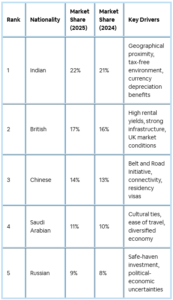
Dubai’s real estate market has experienced significant growth in 2025, attracting a diverse range of international investors. This influx has been driven by the emirate’s robust economic performance, strategic initiatives, and investor-friendly policies. Identifying the top nationalities investing in Dubai’s residential properties provides valuable insights into global investment trends and the factors influencing these decisions.
Comparative Analysis of Foreign Investment in Dubai’s Residential Market
The table below illustrates the top five nationalities investing in Dubai’s residential property market in 2025, alongside their market share and key investment drivers. It also includes a comparison with previous years to highlight trends in investor activity.

1. Indian Nationals: Leading Foreign Investors
Indian investors continue to be the largest foreign buyer group in Dubai’s property market, increasing their market share from 21% in 2024 to 22% in 2025. Dubai’s stable economy, tax-free incentives, and long-term residency programs have cemented its appeal among Indian buyers. The depreciation of the Indian rupee against the US dollar has further incentivized investment in Dubai’s dollar-pegged real estate market, offering both wealth preservation and high-yield opportunities.
2. British Nationals: Sustained Investment Interest
British investors have consistently ranked among the top property buyers in Dubai, with their market share rising to 17% in 2025. The UK’s economic conditions, including rising interest rates and inflation, have made Dubai’s high-yield property sector an attractive alternative. Many British buyers are acquiring properties for rental income, leveraging Dubai’s robust demand in both short-term and long-term leasing markets.
3. Chinese Nationals: Growing Presence Amid Strategic Links
Chinese investment in Dubai’s property market has continued its upward trajectory, reaching 14% in 2025. The Belt and Road Initiative has strengthened economic ties between China and the UAE, leading to increased capital inflows into Dubai’s real estate sector. Additionally, Dubai’s Golden Visa program, which offers long-term residency to property investors, has attracted Chinese high-net-worth individuals seeking international asset diversification.
4. Saudi Arabian Nationals: Cultural and Economic Drivers
Saudi investors have increased their footprint in Dubai’s residential market, now holding an 11% share compared to 10% in 2024. The ease of travel between Saudi Arabia and Dubai, coupled with the UAE’s diversified economic opportunities, has bolstered cross-border investments. Many Saudi buyers favor high-end residential properties in areas such as Downtown Dubai and Palm Jumeirah, reflecting a preference for premium real estate assets.
5. Russian Nationals: Strong Demand for Luxury Properties
Russian investors continue to demonstrate strong demand for Dubai real estate, particularly in the luxury segment. Their market share has grown to 9% in 2025, reflecting geopolitical uncertainties and economic challenges in their home country. Dubai’s status as a safe-haven investment destination, along with its visa-friendly policies, has reinforced its appeal among Russian buyers.
Market Dynamics and Economic Implications
The increasing diversity of foreign investors in Dubai’s real estate market highlights the city’s resilience and global appeal. This sustained international demand has significantly impacted transaction volumes, property values, and overall economic activity. Residential sales in the first quarter of 2025 alone reached AED 120 billion, up from AED 110 billion in the same period of 2024, driven by both new and repeat investors.
Historical Trends in Foreign Investment
Dubai’s property market has evolved significantly over the past five years, with international buyers driving demand. A comparative analysis of foreign investment trends over time reveals:
- 2020-2022: Heavy reliance on international investors, particularly post-pandemic, with buyers from India, the UK, and China dominating.
- 2023: A sharp rise in Russian investment due to geopolitical instability, pushing Dubai’s luxury real estate segment to record highs.
- 2024-2025: A shift toward long-term end-user purchases, with mortgage-backed acquisitions becoming more prevalent among expatriate buyers.
Government Policies Supporting Foreign Investment
Dubai’s government has implemented a series of investor-friendly policies that continue to attract foreign capital, including:
- Golden Visa Program: Providing long-term residency for property investors, enhancing the emirate’s appeal to international buyers.
- Mortgage Accessibility: Competitive financing options have made homeownership more viable for expatriates transitioning from renting.
- New Freehold Expansions: The expansion of freehold zones has provided foreign investors with additional high-potential investment opportunities.
Sustained Growth and Investment Appeal
Dubai’s real estate market remains a key global investment hub, attracting a diverse range of foreign buyers. The combination of regulatory support, economic stability, and strategic development initiatives ensures continued demand from Indian, British, Chinese, Saudi, and Russian investors. As the market moves toward long-term stability, investors are increasingly focusing on sustainable, high-value acquisitions that align with Dubai’s evolving real estate landscape.
